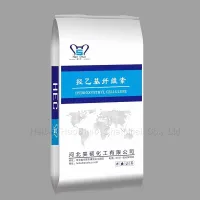Hydroxyethyl Cellulose (HEC) is a versatile polymer derived from cellulose, a natural polymer found in plants. Through a series of chemical modifications, hydroxyethyl cellulose is produced, resulting in a compound with unique properties that find application in various industries. Let's explore some of the key properties of Hydroxyethyl Cellulose:
Water Solubility: One of the distinctive features of HEC is its water solubility. This property allows it to easily dissolve in water, forming clear and viscous solutions. The ability to create stable solutions makes HEC a valuable ingredient in industries where a consistent and uniform viscosity is required.
Thickening Agent: Hydroxyethyl Cellulose is primarily known for its role as a thickening agent. When added to water, it imparts viscosity to the solution, making it useful in a variety of applications, such as paints, adhesives, and personal care products like shampoos and lotions.
Stability in a Wide pH Range: HEC exhibits stability over a broad pH range, making it suitable for use in formulations with acidic or alkaline conditions. This property enhances its versatility and applicability in different industries and product formulations.
Film-Forming Capability: Another valuable property of HEC is its ability to form films. This makes it a useful component in industries such as pharmaceuticals and coatings. The films formed by HEC contribute to the overall properties and performance of the end product.

Suspension and Emulsion Stabilization: Hydroxyethyl Cellulose is effective in stabilizing suspensions and emulsions. This property is particularly advantageous in industries like food, where it can be used to enhance the stability and texture of products like salad dressings and sauces.
Nonionic Nature: HEC powder is a nonionic polymer, meaning it doesn't carry an electric charge when dissolved in water. This nonionic nature contributes to its compatibility with a wide range of other ingredients and chemicals, making it a versatile choice in various formulations.
Biocompatibility: In pharmaceutical and personal care products, the biocompatibility of HEC is a crucial factor. It is considered safe for use in topical applications, such as ophthalmic solutions and skin creams, due to its non-toxic nature.
Temperature Stability: Hydroxyethyl Cellulose exhibits stability over a range of temperatures. This property is beneficial in applications where the product may be subjected to different temperature conditions during manufacturing, storage, or use.
Hydrophilic Nature: The hydrophilic nature of HEC enhances its ability to interact with water molecules. This property is advantageous in formulations where moisture retention or control of water content is essential.
Compatibility with Other Polymers: HEC is often used in combination with other polymers to achieve specific performance characteristics. Its compatibility with a variety of materials allows for the customization of formulations to meet the desired specifications.
In summary, Hydroxyethyl Cellulose's water solubility, thickening ability, stability in different pH ranges, film-forming capability, and other unique properties make it a valuable ingredient in a wide range of industries, including pharmaceuticals, cosmetics, food, and coatings. Its versatility and functionality contribute significantly to the performance and quality of various products in these sectors.



Comments
All Comments (0)